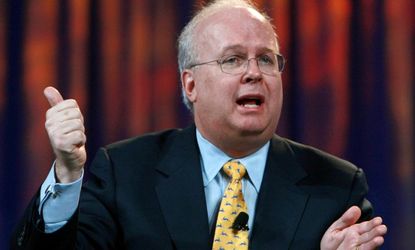What is a 501(c)(4)? And when is the IRS supposed to investigate one?
The questions are at the center of a brewing controversy over the IRS' targeting of Tea Party groups

If you aren't up-to-date on the IRS scandal that has Republicans up in arms and President Obama getting flak from Jon Stewart, here is a quick refresher: Last week, IRS official Lois Lerner apologized for singling out groups applying for 501(c)(4) status that had words like "patriot" and "Tea Party" in their names.
Conservatives claim that the government was trying to intimidate the opposition. Obama called the IRS' actions "outrageous” and "contrary to our traditions."
So what is a 501(c)(4) exactly? The IRS will grant 501(c)(4) status to organizations that are "not organized for profit but operated exclusively for the promotion of social welfare."
Subscribe to The Week
Escape your echo chamber. Get the facts behind the news, plus analysis from multiple perspectives.

Sign up for The Week's Free Newsletters
From our morning news briefing to a weekly Good News Newsletter, get the best of The Week delivered directly to your inbox.
From our morning news briefing to a weekly Good News Newsletter, get the best of The Week delivered directly to your inbox.
If you are starting a non-profit, 501(c)(4) designation offers two important advantages: You don't have to pay taxes and you don't have to disclose your donors.
But here is where it gets tricky: The IRS says that promoting social welfare doesn't include participating in "political campaigns on behalf of or in opposition to any candidate for public office." Unlike strictly non-political 501(c)(3) groups, however, 501(c)(4) organizations "may engage in some political activities, so long as that is not its primary activity."
To the IRS, "political" means directly endorsing political candidates. That explains why the NRA and AARP, which both have 501(c)(4) status, can lobby on larger issues and not run afoul of the IRS.
Critics say the latest controversy has only underscored how groups of all political stripes have taken advantage of the IRS' nebulous guidelines to claim tax-exempt status.
Sign up for Today's Best Articles in your inbox
A free daily email with the biggest news stories of the day – and the best features from TheWeek.com
"If that definition sounds murky — that is, if it’s unclear what 501(c)(4) organizations are allowed to do — that’s because it is murky," writes Jeffrey Toobin at The New Yorker.
"Nowhere does the IRS mention 'an organization formed by top political operatives for the clear and obvious purpose of re-electing or defeating the president," says The Washington Post's Ezra Klein. "But that’s what 501(c)(4)s have become."
In 2012, Stephen Colbert illustrated the hazy definition of 501(c)(4) status with his "Colbert Super PAC SHH!":
Another famous 501(c)(4) organization to emerge that year was Karl Rove's Crossroads GPS. According to ProPublica, when the group was formed, it claimed that it would spend half of its money on public education, 20 percent on research, and only 30 percent on shaping legislation and policy.
Yet, according to ProPublica, it spent $70 million on ads in 2012 telling voters to pick Republican candidates. The lack of scrutiny from the IRS, along with the Citizens United ruling allowing corporations and unions to spend unlimited amounts of money in campaigns, led to the number of both conservative and liberal groups applying for 501(c)(4) status to jump to 3,400 in 2012, from 1,500 in 2010, according to Reuters.
To sort through that pile and find the organizations whose "primary activity" was politics, the IRS depended on keywords — which is why it is in trouble today.
The IRS could learn from this experience and create strict, defined guidelines of what a 501(c)(4) is. The other option, writes Klein, is "that this experience will simply make the IRS even more terrified of regulating 501(c)(4)s," leading to more untraceable, tax-exempt cash in U.S. elections.
Create an account with the same email registered to your subscription to unlock access.
Keith Wagstaff is a staff writer at TheWeek.com covering politics and current events. He has previously written for such publications as TIME, Details, VICE, and the Village Voice.
-
 'Is the death penalty racist? Of course it is.'
'Is the death penalty racist? Of course it is.'Instant Opinion Opinion, comment and editorials of the day
By Harold Maass, The Week US Published
-
 Today's political cartoons - May 8, 2024
Today's political cartoons - May 8, 2024Cartoons Wednesday's cartoons - social media guilt, gag orders, and more
By The Week US Published
-
 Boy Scouts changes name to Scouting America
Boy Scouts changes name to Scouting AmericaSpeed Read The organization is rebranding, citing inclusivity
By Peter Weber, The Week US Published